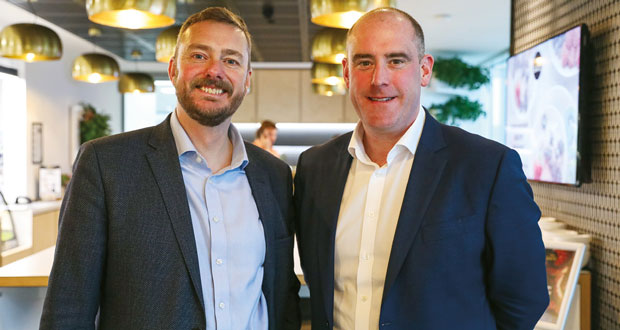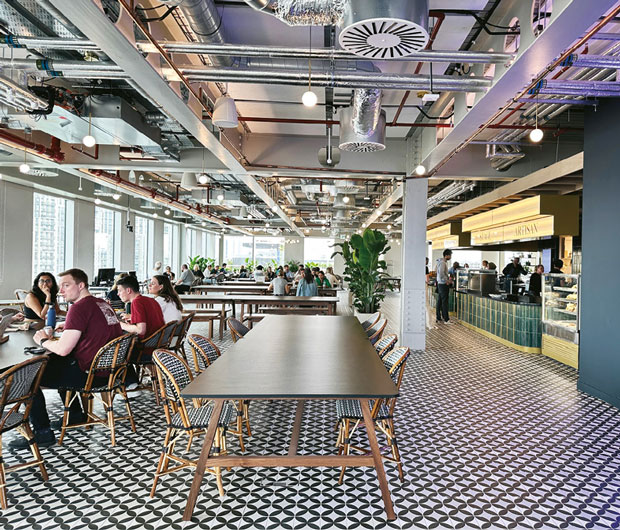Almost one year since workplace caterer BM appointed Co-Managing Directors Antony Prentice and Angus Brydon to lead the next phase of the company’s journey, they explain how they’ve restored the fortunes of the business post-COVID, and why catering is acting as a conduit for bringing people back into the office
Catering has never been as important to the workplace as it is now,” Brydon boldly claims. He adds: “We’ve never seen such an incredible reliance and respect for what we do.”
Brydon and Prentice were officially handed the reins in October 2022, having worked for the business for six and 13 years respectively.
Prior to the COVID-19 pandemic, BM (Bartlett Mitchell as it was formerly known) was flying. The company was approaching turnover of £60 million and employed more than 1,000 people across the UK.
Fast forward three years and throw in a global pandemic, acquisition by WSH, inflation, and a complex and difficult labour market, the new MDs have had quite a different task on their hands.
“It’s safe to say that it has been quite the rollercoaster. We were on top of the world, then our business shrank by two-thirds, and now we are feeling really positive about the market again,” says Brydon.
And rightly so. Since the pair have taken over, the company has returned to its pre-COVID turnover figures and achieved a 95 per cent client retention rate.
TRUSTED ADVISORS
“It’s sounds clichéd to say, but we’ve gone back to the basics and the fundamentals of our business,” says Brydon. “If COVID taught us anything, it was that we are in a really good position to support and advise our clients and customers on all sorts of matters – it’s not just limited to food.”
He adds: “We work with so many clients from across the UK, all of whom will have very distinct needs. However, at its core, they all feed their people and have workplaces. We are privy to so much insight so we can share what works and what doesn’t with so many people, inside the fabric of any building. But, most importantly, we have been able to truly understand the new and changing needs of employees.”
The company demonstrated this during the pandemic through its regular online ‘amuse bouche’ workshops and food events, which became hugely popular with clients and team members, bringing estates and facilities professionals together to discuss how they were tackling the issues of the day, all while cooking and preparing food over Zoom.
“These sessions really brought home the value we could add to clients,” says Prentice.
“We knew that we could be a truly trusted advisor to so many of our partners and, given everything that was going on, we had a real opportunity to demonstrate this,” agrees Brydon.
Post-pandemic, the challenges presented by the cost-of-living crisis and hybrid working patterns have meant business uncertainty among both clients and customers, but also sparked conversations about how catering can be part of the solution.
CATERING HELPING TO BRING BACK EMPLOYEES
According to the Gensler Research Institute’s US Workplace Survey 2022, 83 per cent of employees would return to the office at least one additional day per month if their office provides their ideal mix of experiences, and Professor Jeremy Myerson in his book ‘Unworking: The Reinvention of the Modern Office’, suggests these experiences could include concierge-style services, technology support, bicycle maintenance, exercise and wellbeing, from gym classes and meditation to nutrition.
Deloitte also reinforced this through a study which found that employees also want to feel good when they come to the workplace – 59 per cent of employees would consider taking a job with a company that offers better wellbeing benefits than their current employer.
There has been a challenge around the perceived value of food and how much customers are prepared to spend on it, particularly against a challenging economic backdrop, which has seen some clients switch to free issue (i.e. free food and drink to employees).
One client who has gone completely free issue has consequently returned to pre-pandemic levels of office occupancy Monday through Thursday, while another that offers specific free issue days sees a spike in attendance on those days, they explain.
“If you want to get people back into the business, use catering,” says Brydon. “If you are investing in catering, really go for it. Make it a USP. People may think we are bound to say this but the evidence is there; where clients have invested properly, we have seen a massive return to the office.
“We want to work with clients who see catering as a part of their culture,” says Brydon.
Prentice elaborates: “We don’t want transactional relationships. We don’t believe in a race to the bottom scenario. Catering is an investment. It’s important that we are all on the same page.”







